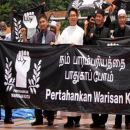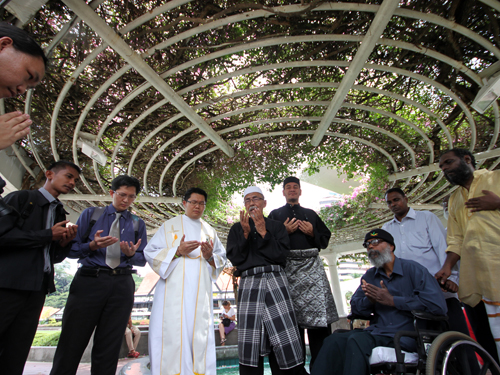Viewpoint: Priests And Politics

The Passion of Christ as narrated in John’s gospel explains that after Christ death on the cross, Joseph of Arimathea asked Pilate for the body of Jesus. John points out that Joseph of Arimathea was a secret disciple of Jesus and that he feared the Jews.
With him was Nicodemus, another ‘secret’ follower of Christ. These men wrapped Jesus’ body in a mixture of myrrh and aloes in strips of linen and placed the body in a tomb.
What seems uncanny is that these ‘disciples’ who were once afraid to be seen with Christ in the open have now come forward at a time when it would seem most dangerous to be associated with Christ. What however is clear is that they took a great risk in taking ownership of Christ body at a time when all others associated with Christ went into hiding out of fear.
Like Joseph of Arimathea and Nicodemus, circumstances will compel us to act and put forward our faith in the open! In other words, there is a time we need to walk the talk!
Recently, some expressed concern over the presence of our priests and religious at public assemblies challenging the authorities and voicing their condemnation openly over various issues that are unjust. Perhaps, to these people, the role of our priests and religious are best served by taking care of our parish and keeping out of politics.They overlook our Church’s stand on social justice. Surely, in the face of corruption, abuse of power and legislating laws that are unjust (to name a few), the Church cannot sit by and pretend that all is good. We have seen the churches’ stand in various countries in the past. We have seen her stand in the Philippines against corruption during the Marcos era. We have seen her stand in South America on abuse of power, especially through the late Archbishop Oscar Romero in El Salvador.
We have seen her stand through Pope John Paul II who, as the Bishop of Krakow, challenged the then communist regime in Poland through rallies and assemblies against unjust laws. He challenged the regime for failing to build a church in the new township of Nowa Huta where the regime intended to pursue their communist propaganda to populate the place with industries only. Eventually, a church was consecrated some 20 year later in 1977.
There are numerous examples we can set before us on the Church’s views and actions against injustice!
Closer to home, there has been a greater call for clean and fair elections. Repeated statements on the irregularities in the electoral roll have been raised and other misnomers in our election process which have yet to be addressed. The introduction of the Peaceful Assembly Act 2011 was anything but peaceful as its enactment has reduced the constitutional rights of the people, in particular in the areas of freedom of speech and association.
Then there is the great scandal over the loan of RM250 million to the National Feedlot Corporation (NFC) that has appeared consistently in the press and the alternative media.
The repeated allegations made by Hassan Ali and Perkasa against Christians appear to go unnoticed by the authorities. They seem indifferent in taking action against them.
The introduction of the Security Offences (Special Measures) Act 2012 whilst putting an end to the dreaded ISA appears to be a setting for future abuses. It allows the detention for 28 days without trial, to be held for 48 hours without access to legal representation and it allows the police to make an arrest without a warrant if the officer merely “has reason to believe” that the person may be involved in ‘security offences’, a term that is defined vaguely in the Act.
The list of injustices goes on.
In light of such adversities, our priests and religious cannot be restrained by a few from voicing out their views against such injustices. Canon Law itself calls on our priests and religious to stand up and raise their concerns over the injustices. Canon Law 768 provides,
§1. Those who proclaim the divine word are to propose first of all to the Christian faithful those things which one must believe and do for the glory of God and the salvation of humanity.
§2. They are also to impart to the faithful the doctrine which the magisterium of the Church sets forth concerning the dignity and freedom of the human person, the unity and stability of the family and its duties, the obligations which people have from being joined together in society, and the ordering of temporal affairs according to the plan established by God.
We must have the courage to represent our faith when it is most needed, as Joseph of Arimathea and Nicodemus had done. The call by some ostracising our priests and religious for speaking out against these injustices should instead be channelled against those who keep repeating these injustices!
Disclaimer: The views expressed in this article are the views of the author(s) and do not necessarily reflect the views or policies of the Catholic Lawyers Society Kuala Lumpur. CLS makes no representation concerning, and does not guarantee the source, originality, accuracy, completeness or reliability of any statement, information, data, finding, interpretation, advice, opinion, or view presented.
Joy W. Appukuttan
- 9313 reads
 Printer-friendly version
Printer-friendly version


